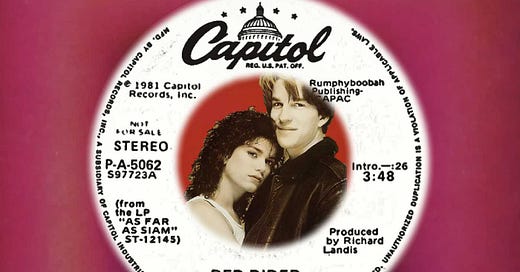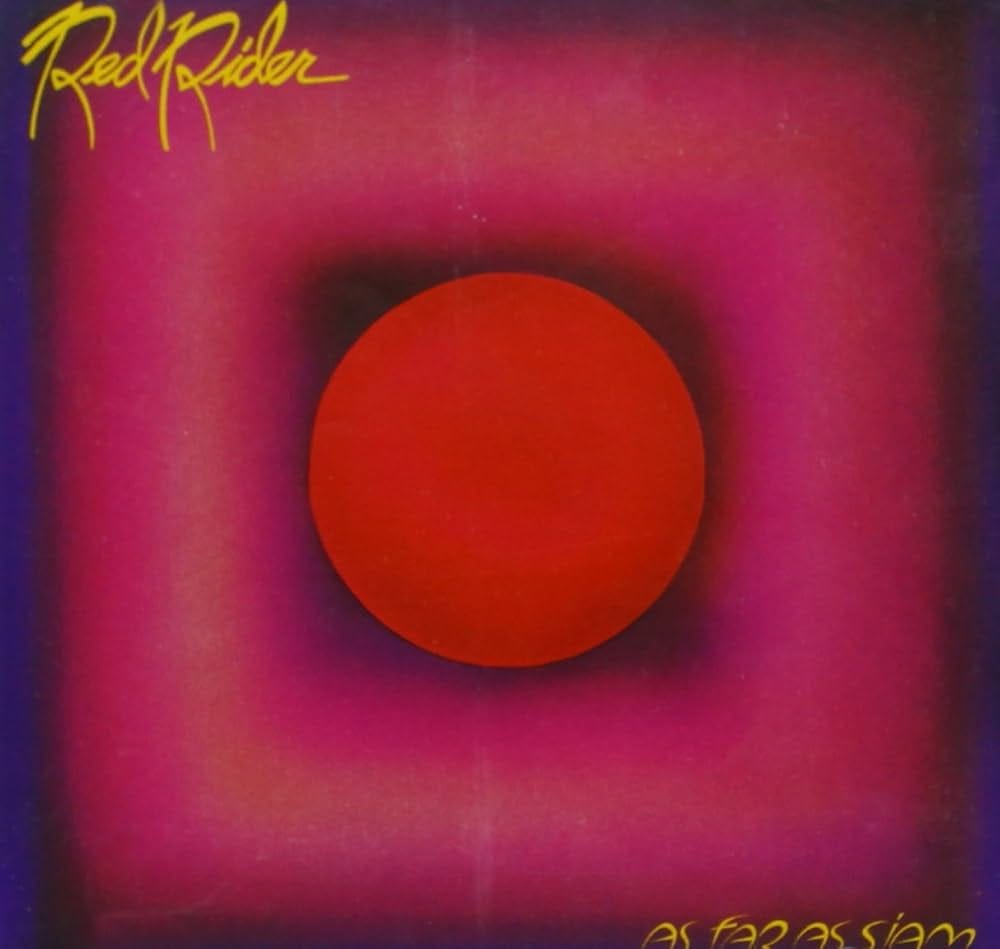‘Lunatic Fringe’: We Know You’re Out There
The ’80s Banger That Is An Unlikely Anthem For Our Troubled Times
By Jim Ruland
“The first time I heard…” is my least favorite opening to a music essay because it puts the song, the band, the music at a remove, burying it in layers of time, distance, and the rosy glow of nostalgia—before we even find out the subject of the essay.
It is, however, a logical place to start thinking about a music essay. That first time provides context, unlocks a specific time and place in our memories where the music provides the soundtrack.
I recently heard the opening to “Lunatic Fringe” by Red Rider and felt that delicious tingle of a favorite song that had been hibernating in my memories awakened after a long slumber. But my memories stopped there.
Why was this song so familiar? Where have I heard it before? How do I even know it?
I hadn’t a clue.
Neither the title of the song nor the name of the artist meant anything to me. I’d never owned this record. It wasn’t part of a favorite music video or memorable performance. All I had to go on was the music and the feelings it called up, which were intense. Was it possible I’d forgotten?
I started digging and found the answer, but first let’s talk about the song.
It opens with an eerie whistling sound, a call from a wild place, overtaken by the kind of heavily distorted synthesizer that I associate with battle cruisers moving into formation to annihilate an unsuspecting planet.
Then, the guitar. A simple chord played twice and repeated several times. We’re building to something here. Something epic and that epic thing is the most beautiful pick slide I’ve ever heard. Brian Baker rips off a half-dozen of these a night but this pick slide is slower, meatier, like a four-course meal, and when it ends the song begins.
Drums, bass, hypnotic guitar picking, and laid back vocals, all shockingly mellow because “Lunatic Fringe” isn’t a song, but a warning.
The internet pointed me to where I’d first heard “Lunatic Fringe”: It was on the soundtrack for the 1985 movie Vision Quest, a movie that stirred up all kinds of feelings.
I remembered liking the movie a lot, but I couldn’t recall the details. Was it about wrestling? And maybe Matthew Modine was in it?
Vision Quest is about a kid named Louden Swain who decides he is going to wrestle the best wrestler in the state, Brian Shute, who has never lost a match. The problem? Louden has to drop two weight classes from 190 to 168 pounds to do it.
No one thinks this is good idea. Not his coach, who thinks he’s crazy, and not his teammates, who are pissed that he is moving down into their weight classes. Louden is a relative newcomer to the sport with perfect balance and uncanny strength but he is not a jock. His teammates aren’t his friends. He’s just really, really determined.
At the beginning of the movie Louden announces in a voiceover that he has decided this is how he is going to leave his mark on the world. And then he does it. He skips meals, runs everywhere he goes, starts exercising the second he wakes up. The first time we hear “Lunatic Fringe” is during one of his early morning workouts.
Louden is a little bit crazy and teenage me loved him for it. I wasn’t an athlete. I wasn’t preternaturally good at anything. But I had a paper route and didn’t have a car so I walked everywhere I went. I walked around my neighborhood in the dark and then I walked to school and then I walked home. I spent a lot of time with my thoughts and dreamed of transforming myself. My dad was a Navy officer. My mom was a nurse. I went to Catholic school. Psychotic discipline wasn’t a dealbreaker for me, which is probably why I joined the Navy after graduation. Ten seconds into boot camp and my transformation was underway.
The second act of Vision Quest is kind of a mess.
Louden and his dad—his mom is out of the picture—take on a boarder who, surprise, surprise, is a hot 22 year old art student named Carla. Would it also surprise you to learn that a movie made in 1985 featuring a bunch of wrestlers would serve up plenty of toxic masculinity?
But it’s at least interesting. Louden is a good guy but his teammates are animals. Louden bares his soul to his friend Kuch, a Mohawk-wearing, motorcycle riding bad boy who is regularly beaten by his alcoholic father and played to perfection by Michael Schoeffling (aka Jake Ryan from Sixteen Candles). Yes, that guy.
Kuch blabs to his teammates everything that Louden tells him and once they hear that he’s sharing a roof with Carla, well, you can imagine.
What’s interesting is you can see this toxicity gradually poisoning Louden’s mind. Louden, left to his own devices, would rather run in the rain in a sauna suit or write articles about the clitoris for the school newspaper. There’s a scene early in the movie where a guy comes onto him in a hotel room and Louden politely excuses himself and scurries away, freaked out and maybe a little turned on. There’s a lot of homoerotic grappling and grimacing in this movie.
(If you decide to watch the movie, I have one question I want you to focus on: Where do the red shoes Louden’s wearing at the end of the movie come from?)
Once Louden is convinced that Carla is sleeping with his English teacher, things get very dark, but only briefly, and then he resumes his quest to wrestle Shute, who is just as psychotically self-determined as Louden. When we meet him, Shute is carrying a log on his shoulders up the bleacher steps like meathead Jesus. There’s no coach, no abusive father in sight. This is what this maniac does for fun.
Vision Quest is based on a novel by Terry Davis who was an English teacher, a wrestling coach, and liked to ride motorcycles. Write what you know, right? The novel was adapted by Darryl Ponicsan who was also a novelist and wrote The Last Detail, which is a sailor story and Jack Nicholson’s breakout role.
I’m not going to spoil the movie for you, the video below does that, but I’d be remiss not to mention that the score for the movie was written by the German electronic collective Tangerine Dream, and the rock ballads that make up the soundtrack blend exquisitely with the incidental music.
Oh, it’s also Madonna’s breakout role. She sings “Crazy For You” in a little dive bar in the Pacific Northwest. Good luck, kid!
The song “Lunatic Fringe” returns a second time during Louden’s final preparation for the big match and the hair on my arm stands up just thinking about it. Louden isn’t perfect, but he’s set his mind to do this one thing and now that moment is here. I’m not even sure if the outcome matters to him. He did what no one thought he could do. He’s already won. Fittingly, the final match is kind of a letdown.
After rewatching the movie a few weeks ago it occurred to me that the voice over at the beginning of the movie can be read like a letter from someone who has made up his mind to take his own life, a suicide note.
Everyone in this movie is kind of fucked. There are no role models, just people locked into their jobs with no way out. All the men in Louden’s life come to see the big match because they know this is likely the pinnacle of his existence, and watching it is all they have to look forward to.
“Lunatic Fringe” is a great song. It might even be perfect. I can do without the “Whoa-o-o-ohs” that makes up the chorus. I respect the lap-steel guitar solo, but though it’s not really my thing it’s beautiful. The band video is kind of absurd. Unless they’re playing their instruments, the members of Red Rider stand perfectly still, like they would rather be in a poster hanging on a bedroom wall than a cheesy music video.
What is “Lunatic Fringe” about?
Well, it’s not about wrestling. It’s not about being tormented by love. When I heard it for the first time I probably thought of it as a contemporary take on the territory Pink Floyd mined in The Wall, a movie I watched over and over again in high school after I discovered weed. If nothing else, the understated delivery of the vocals call to mind songs like “Is There Anybody Out There?” and “Comfortably Numb.”
But it’s not about drugs and that’s not what makes it perfect. “Lunatic Fringe” is about antisemitism. The words “lunatic fringe” mean exactly what you think they do: the lunatic fringe of the far-right, the extremists with the most vile ideology imaginable, the people who warp history and twist facts to suit their perverted worldview.
“There have to be people who aren’t Jewish who speak out,” Red Rider songwriter/vocalist Tom Cochrane told The Canadian Jewish News in 2021, adding, “It’s a song about standing up for what is right, so I’m proud of the song from that point of view, proud that I could say something.”
This is not a song about meeting people in the middle and coming to an understanding. This is not a song about reaching across the aisle. It’s a song about calling out Nazis and hunting them down. Check out the last lines:
Lunatic fringe
We all know you're out there
Can you feel the resistance?
Can you feel the thunder?
When Cochrane hits the second syllable of “thunder,” he really goes for it. He is letting all the Nazis know we aren’t having any of their bullshit. We are fucking coming for you.
Cochrane wrote the song in the second person plural for a reason. He knew what he was doing. He was writing an anthem for those on the right side of history in case it was ever needed again and that moment, my friends, is now.
We can all use a little of Louden Swain’s psychotic self-determination right now, that unshakable conviction that this is what we’re going to do and we’re not going to stop until we’ve done it. And what are we going to do?
Fight Nazis. Stand up for the oppressed. Lock arms with our neighbors and lift up our brothers and sisters when meathead Jesus knocks them down.
That’s the message of “Lunatic Fringe.” The myth of Vision Quest is that we don’t always get to decide how we leave our mark on the world. We can try, but sometimes the world forces our hand, calls us to account, and now is one of those times.
Jim Ruland is the LA Times bestselling author of Corporate Rock Sucks: The Rise & Fall of SST Records, which was named a best book of 2022 by Pitchfork, Rolling Stone and Vanity Fair. He is also the co-author of Do What You Want with Bad Religion and My Damage with Keith Morris, the founding vocalist of Black Flag, Circle Jerks, and OFF! Jim is an award-winning novelist and a frequent contributor to the LA Times and Razorcake fanzine. He writes a weekly newsletter, Message from the Underworld, about books, music, and books about music.









Red Rider is one of the most underrated bands in Canadian history. Great piece, Jim!
I saw Red Rider back in 1979, opening for The Kinks here in Toronto! It was my second concert ever (first one was Queen in 1978). I didn't know Tom Cochrane would go on to much fame and fortune, at least in Canada.